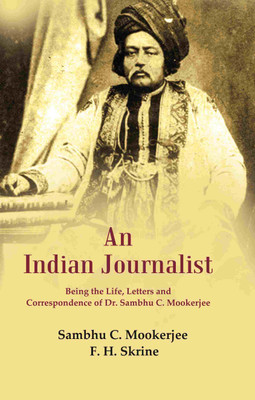An Indian Journalist: Being the Life, Letters and Correspondence of Dr. Sambhu C. Mookerjee(Paperback, Sambhu C. Mookerjee, F. H. Skrine)
Quick Overview
Product Price Comparison
About The Book: There is something inexpressibly touching in the eagerness with which we strive to rend the veil concealing the personality of distinguished men. We love to see them in dishabille, so to speak: to know their inmost thoughts, the trivial incidents of their daily lives. No biographers retain a lasting hold on the public taste but those who gratify this universal passion. Like all our sentiments it is based on mixed motives. Curiosity is among them: but there is also a secret desire to compare our own sensations and impulses with those of our hero. Their cousins can tell you nothing about them. They live in their writings. And so their home and school life are trivial and common place. If you would know their tastes and complexions, the most admiring of their readers most resemble them." This dictum, pace tanti viri, is wanting in truth as well as in originality. Men of the highest intellect are not gregarious. A craving for intercourse with others comes of a vacant mind : and the little knot who, in every age, hold high the lamp of progress shun the babble of the common herd. There are natures as pure, as dazzling, and as inaccessible as the highest peaks of the Himalayas: and not material for their life-story but a historian capable of assimilating it is generally wanting. And it is surely seldom the case that a great original thinker puts his best work in his books. About The Author: Sambhu Chandra Mukherjee (1839-1894) writer, journalist. Sambhu Chandra Mukherjee was born in a middle-class Brahmin family in the 24-Paraganas on 8 May 1839. He studied at the Oriental Seminary (1848-53) and at the Hindu Metropolitan College. In 1855, while still at college, he brought out the Calcutta Monthly Magazine in which he was assisted by his friend, Krishnadas Pal. In 1856, he became the Editor of the Morning Chronicle. He joined the hindu patriot in 1859 as Assistant Editor, subsequently becoming Editor. He was also working at this time as Headmaster of the Calcutta Training Academy. He was associated with Mookherjee's Magazine (1861) which played a prominent part in awakening economic and political nationalism. It was his association with this magazine that established his fame as a journalist. He started the weekly journal, Reis and Rayyet in 1882 and continued it till his death on 7 February 1894. He was also associated with the Sumachar Hindustani, and the Hindu Intelligencer. Francis Henry Bennett Skrine (1847ŌĆō1933) was an English traveller, orientalist and official in British India. He was the son of the Rev. Clarmont Skrine of Warleigh Lodge, Wimbledon, previously an army officer, and his wife Mary Anne Auchmuty Bennett, daughter of Major Charles Butson Bennett. He was educated at Blackheath School and entered the Indian Civil Service in 1868. In 1870 Skrine was appointed assistant magistrate and collector in Nadia district. He worked on famine relief in Bihar during 1874, and in Madras in 1877ŌĆō8. He was officiating commissioner of Bhagalpur in 1893ŌĆō4. He became collector of customs at Calcutta in 1895, and commissioner of Chittagong division, retiring in 1897. Subsequently Skrine travelled in Central Asia.


